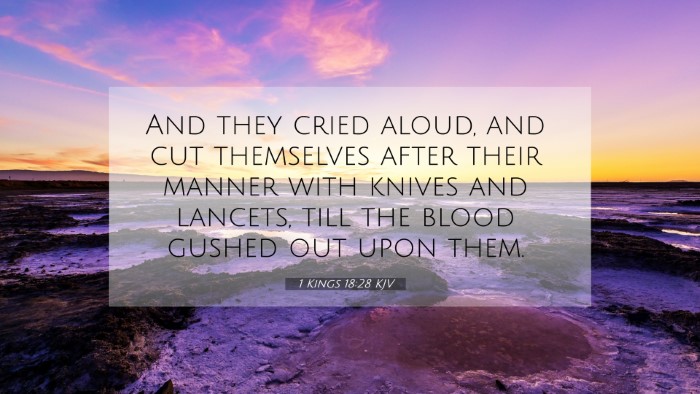Understanding 1 Kings 18:28
Verse Context:
In 1 Kings 18:28, we encounter the prophets of Baal as they cry out and cut themselves in their desperate attempts to call upon their god for fire to consume their sacrifice. This act highlights their fervor as well as the futility of idolatry. The verse captures a significant moment in the confrontation between the worship of Yahweh and the worship of false gods.
Summary of Commentary Insights
Matthew Henry:
Henry notes that the cutting of the prophets is an act of despair and devotion to a non-existent deity. This absurdity demonstrates the lengths to which individuals may go when they abandon true worship, seeking to gain attention from their gods through extreme measures.
Albert Barnes:
Barnes emphasizes the emotional and spiritual turmoil of the prophets of Baal. Their actions, which include cries and self-harm, are indicative of the deep binding influence that idolatry can have on a person's life and spirit, leading one to act irrationally in hopes of divine intervention.
Adam Clarke:
Clarke draws attention to the cultural practices of the time, wherein such self-harm was accepted among pagan rituals. He suggests that this exposes the stark difference between the living God and false gods who do not respond to the passionate cries of their followers.
Theological Reflections
This verse serves as a poignant reminder of the dangers of idolatry. It illustrates the futility of turning to anything other than the true God for answers and assistance in times of distress. The intense actions of the prophets of Baal take on a metaphorical significance as they reflect the broader struggle of humanity in seeking fulfillment and purpose.
Related Bible Verses
- 1 Kings 18:26 - The prophets call upon Baal.
- James 5:16 - The effectual fervent prayer of a righteous man.
- Isaiah 44:17 - Speaking of idols and their worthless nature.
- Jeremiah 10:14 - The folly of crafted idols.
- Romans 12:1 - Offering ourselves as living sacrifices, holy and pleasing to God.
- Matthew 6:24 - No man can serve two masters; choosing between God and wealth.
- Psalm 115:4-8 - The futility of idols that have mouths but do not speak.
Links Between Biblical Texts
1 Kings 18:28 serves as a rich example for those interested in biblical cross-references and thematic studies. The practice of self-harm among worshippers of Baal resonates with the call to true worship found in the New Testament and the severe warnings against idolatry throughout the scriptures. By examining these connections, we can better understand the overarching narrative of the Bible, which espouses the centrality of God’s sovereignty and the futility of idolatry.
Cross-Referencing and Analysis
This analysis teaches us how to recognize links not just between nearby verses but across wider sections of both the Old and New Testaments. The excessive rituals of the prophets of Baal reveal profound truths about human inclination towards self-made religion. As we delve into these theories, it becomes essential to utilize tools for Bible cross-referencing, such as concordances, cross-reference guides, and thematic studies, to uncover further links such as the struggle between faith and idolatry.
Thematic Bible Verse Connections
The thematic connections drawn from 1 Kings 18:28 ultimately relate to several themes:
- The futility of false worship: Illustrated through the actions of the prophets.
- Divine responsiveness vs. the silence of falsehoods: Contrasting God’s presence with the impotence of idols.
- The cost of devotion: Self-harm in pursuit of a nonexistent god.
Applying the Insight
Understanding 1 Kings 18:28 through these various lenses not only enhances our biblical literacy but also enriches our spiritual lives. We are invited to reflect on our own lives: What are the modern-day idols that compete for our attention and devotion? In what ways do we cry out in desperation to things that cannot respond? This understanding encourages deep introspection and a reaffirmation of faith in the living God.
Conclusion
Engaging with 1 Kings 18:28 opens up a rich dialogue within scripture. Through cross-referencing, we uncover layers of meaning that inform our comprehension of faith, idolatry, and true devotion. The intricate connections between various passages offer profound insights for personal growth, sermon preparation, and systematic study of biblical themes.







